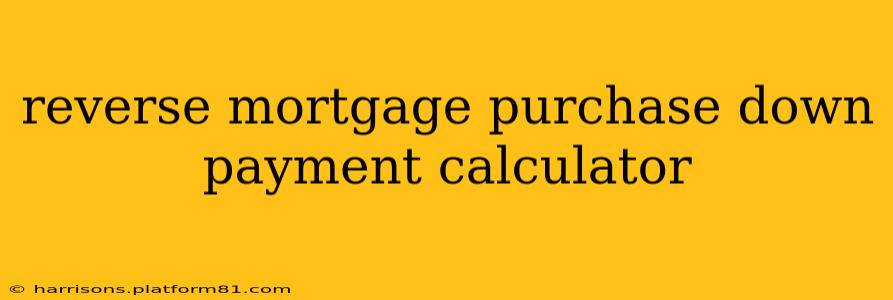Buying a home with a reverse mortgage can be a complex process, but it's also a potentially powerful tool for older homeowners looking to leverage their home equity. A key part of this process is understanding the down payment requirements. Unfortunately, there isn't a single, universally accepted "reverse mortgage purchase down payment calculator" in the way that there are for traditional mortgages. The down payment needed will vary significantly depending on several factors. This article will break down those factors and help you understand how to estimate your down payment needs.
What is a Reverse Mortgage?
Before we dive into calculations, let's clarify what a reverse mortgage is. Unlike a traditional mortgage where you pay down the loan principal over time, a reverse mortgage allows you to borrow against the equity in your home and receive funds as a lump sum, line of credit, or monthly payments. You don't make monthly principal and interest payments during your lifetime or as long as you live in the home and meet the loan terms. The loan is typically repaid when the home is sold, or upon the death of the last surviving borrower.
Factors Affecting Reverse Mortgage Purchase Down Payment
Several crucial elements determine the down payment needed for a home purchase using a reverse mortgage:
-
Home Price: The purchase price of your desired home is the foundation of your calculation. A higher purchase price naturally requires a larger down payment.
-
Loan-to-Value Ratio (LTV): Reverse mortgages have LTV restrictions. This is the ratio of the loan amount to the appraised value of the home. Because the loan amount is capped, you'll need to provide a larger down payment if your chosen home's price exceeds the maximum loan amount. LTV limits vary depending on the type of reverse mortgage and the lender.
-
Appraised Value: The lender will appraise the property to determine its market value. This appraisal is crucial, as it directly impacts the maximum loan amount you can receive and consequently, your down payment requirement.
-
Closing Costs: Remember to factor in closing costs, which can be substantial and vary depending on your location and lender. These costs are usually paid upfront and add to your overall expenses.
-
Type of Reverse Mortgage: Different types of reverse mortgages (HECM, Proprietary) have different requirements and qualifications which impact down payments and available loan amounts.
-
Your Credit Score and Financial Situation: While reverse mortgages don't have the stringent credit score requirements of traditional mortgages, a good credit score may influence your loan terms and potentially reduce required down payment. Your financial situation and assets may also impact the approval process.
How to Estimate Your Down Payment
While a dedicated, interactive calculator doesn't exist for reverse mortgage purchases, you can approach the estimation in several ways:
-
Consult with a Reverse Mortgage Lender: The best approach is to work directly with a reverse mortgage specialist. They can assess your financial situation, the home you're interested in, and provide a personalized estimate of the down payment you'll need based on prevailing LTV ratios and closing costs.
-
Use a Traditional Mortgage Calculator (with caution): A standard mortgage calculator can give you a rough idea of potential loan amounts, but you MUST remember that this is just an estimate and won't account for reverse mortgage-specific rules and limitations.
-
Manual Calculation (Advanced): For the most accuracy, you will need to obtain information from potential lenders regarding current loan limits based on your age and location. This will allow you to roughly subtract the maximum loan amount available from the purchase price of your home, to arrive at a rough estimate of your downpayment.
What are the different types of reverse mortgages?
Reverse mortgages are primarily categorized into two types:
-
Home Equity Conversion Mortgages (HECMs): These are insured by the Federal Housing Administration (FHA), offering some borrower protections.
-
Proprietary Reverse Mortgages: Offered by private lenders, these mortgages generally come with higher fees and potentially less favorable terms than HECMs.
Each type may have different down payment requirements.
What are the fees associated with a reverse mortgage?
Reverse mortgages come with various fees, which can significantly add to the overall cost. These typically include:
-
Origination fees: A percentage of the loan amount.
-
Closing costs: Similar to traditional mortgages, but can vary.
-
Mortgage insurance premiums: For HECM loans.
-
Servicing fees: Annual fees for loan administration.
It's vital to understand these fees before you proceed.
How can I find a reputable reverse mortgage lender?
Thoroughly research and compare lenders before making a decision. Look for lenders with experience, good reviews, and transparent fee structures. Consult with multiple lenders to get various offers and find the best fit.
Remember, the process of obtaining a reverse mortgage and understanding the necessary down payment is best navigated with the assistance of a qualified professional. This article provides general information and should not be considered financial advice. Always consult with a reputable reverse mortgage lender and financial advisor before making any decisions regarding your home equity.
